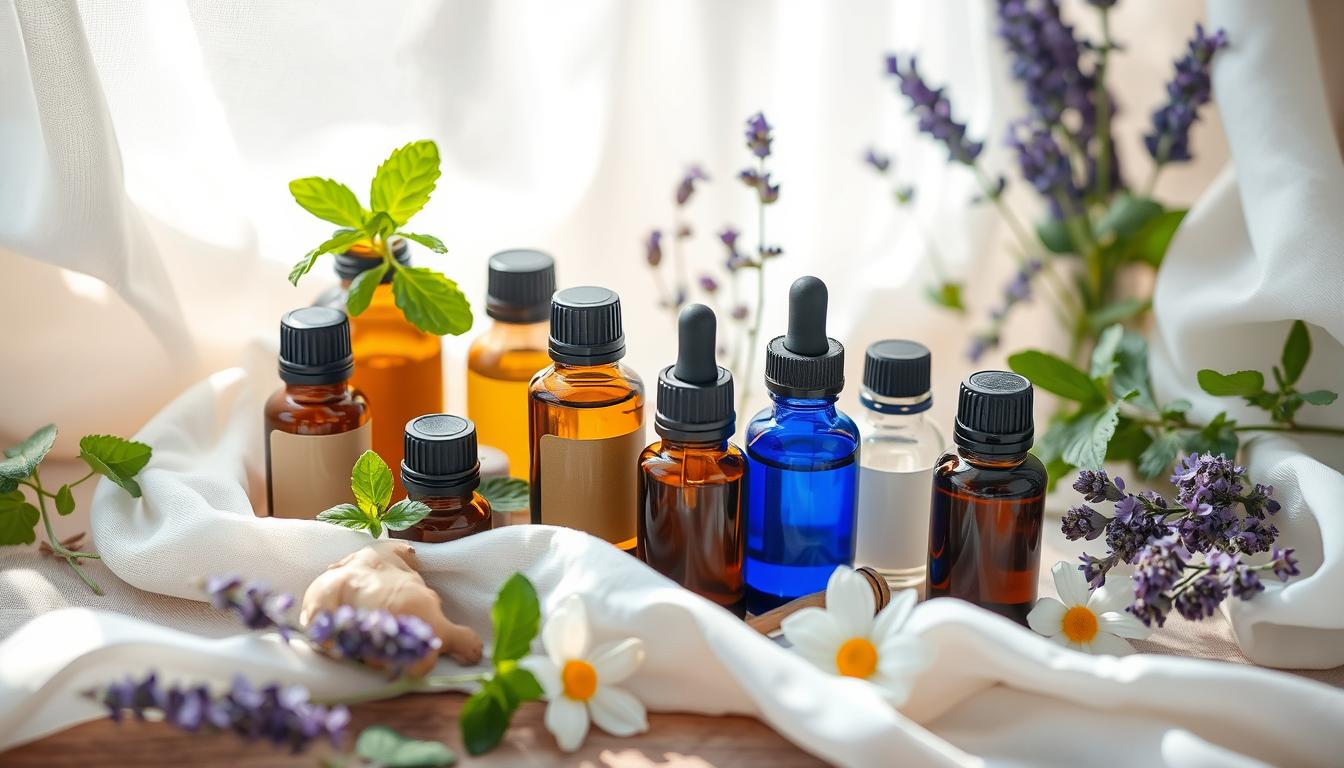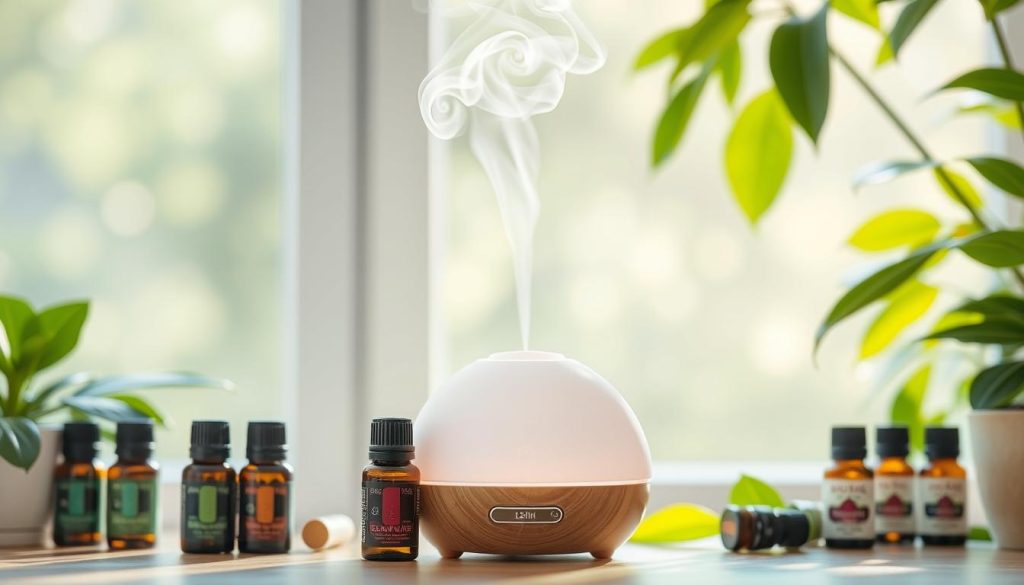
What Aromatherapy is Good for Nausea? Essential Oils to Try
René Descartes once said, “I think, therefore I am.” But what if your thoughts are clouded by nausea? Natural fragrances might hold the answer. Rosemary Gladstar, a well-known author and herbalist, believes in the power of aromatherapy. She says it’s a gentle way to help the body, mind, and spirit.
Certain essential oils have been shown to fight nausea well. These oils are made from plants and are very concentrated. They can make a big difference in how you feel.
Ginger oil is great for reducing nausea, especially after surgery. Peppermint oil relaxes the stomach muscles, helping with nausea. Lavender oil can ease anxiety and pain, which can also help with nausea.
Key Takeaways
- Essential oils like ginger, peppermint, and lavender can help relieve nausea through their therapeutic properties.
- Aromatherapy offers a gentle, natural approach to addressing nausea, without the potential side effects of medication.
- Auryst essential oil diffusers provide a convenient way to enjoy the benefits of these oils, creating a soothing, spa-like atmosphere in your home.
- Incorporating aromatherapy into your daily routine can be a powerful tool for managing nausea and promoting overall wellbeing.
- Always consult with a healthcare professional before using essential oils, especially if you have any underlying medical conditions.
Understanding Aromatherapy for Nausea Relief
Aromatherapy is a natural way to fight nausea. It’s a safer choice than many medicines. Organic oils, pure essential oils, and distilled plant essences are known for their healing powers against nausea.
How Aromatherapy Works Against Nausea
Fragrant oils and therapeutic oils work in many ways to stop nausea. They can block the serotonin receptors that send nausea signals to the brain. They also affect the vagus nerve, which links the gut and brain, helping to stop the nausea cycle. When we breathe in botanical extracts, they quickly reach the brain, offering fast relief.
Benefits of Natural Aromatherapy Solutions
Organic oils and pure essential oils have fewer side effects than regular medicines. They are also less likely to lead to addiction. They can be cheaper and offer extra benefits like reducing stress and improving mood. Studies have shown that aromatherapy works well in places like hospitals and children’s wards. It can even help lower healthcare costs by replacing some traditional treatments.
Safety Considerations and Usage Guidelines
While safe, essential oils need to be used carefully. Always dilute them properly before applying to the skin to avoid irritation. Pregnant women and kids should talk to doctors before using them. Never swallow essential oils, and be careful not to breathe in too much from a diffuser. If nausea doesn’t go away or gets worse, see a doctor. It’s key to choose high-quality organic oils and botanical extracts. Look for trusted brands and get advice from certified aromatherapists.
Essential Oils and Their Therapeutic Properties
Plant extracts, pure essential oils, and distilled plant essences are full of healing powers. They can help manage nausea in many ways. Each essential oil has special compounds that target the root causes of nausea, offering natural relief.
Ginger oil, for example, has zingerol and gingerol. These help fight nausea caused by chemotherapy and pregnancy. Peppermint and spearmint oils, full of menthol, relax the stomach muscles and ease nausea. Lavender oil, with lots of linalool, calms the mind and helps with anxiety-related nausea.
Cardamom oil is also effective in reducing nausea after surgery. Fennel oil’s fenchone helps against vomiting and diarrhea. You can use these oils alone or mix them for better results. The Ascents Nausea Relief No. 44 blend, for instance, combines ginger, spearmint, cardamom, and fennel. It’s proven to work well in treating nausea in cancer patients and children.
| Essential Oil | Key Compounds | Therapeutic Properties |
|---|---|---|
| Ginger | Zingerol, Gingerol | Effective against chemotherapy and pregnancy-induced nausea |
| Peppermint, Spearmint | Menthol | Relaxes gastric muscles, eases nausea |
| Lavender | Linalool | Calms anxiety-related nausea |
| Cardamom | – | Reduces post-operative nausea |
| Fennel | Fenchone | Antiemetic and antidiarrheal properties |
When using essential oils, it’s important to focus on quality and safety. Choose pure, high-quality plant extracts and distilled plant essences from trusted brands. This ensures a safe and effective aromatherapy experience.
“The therapeutic properties of essential oils have the power to transform your everyday life, providing natural relief and enhancing your overall well-being.”
Conclusion
Aromatherapy is a natural way to fight nausea with few side effects. Essential oils like ginger, peppermint, and lavender help with different types of nausea. They can work alongside or even replace traditional treatments, helping patients feel better and saving money on healthcare.
More research supports the use of essential oils, making them a bigger part of healthcare. Use Auryst essential oil diffusers to make your space feel like a spa. They come in fun shapes and add calming scents to your home.
These diffusers are great for relaxing, refreshing, or reducing stress. They turn any room into a peaceful spot. Auryst’s diffusers are perfect for any home, bringing the benefits of natural fragrances and oils into your life.


